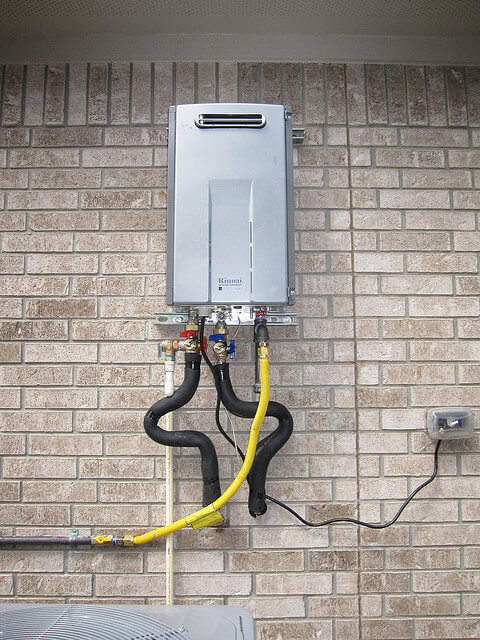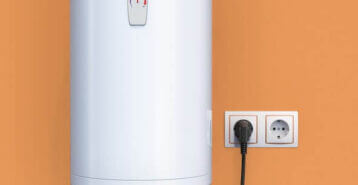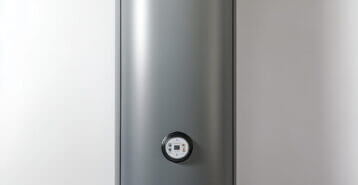How Much Does a Tankless Water Heater Cost?
Tankless water heater costs include both the unit price and installation. Here’s a quick breakdown.
Cost of Tankless Water Heater Units
Typical unit price: $500 to $2,000
Tankless water heater prices vary based on brand, flow capacity, energy efficiency, and whether the unit runs on electricity or gas.
High-output or feature-rich systems, including higher flow rates, advanced controls, and premium efficiency, can cost $2,000+. These models may deliver better performance and a longer service life.
Installation Costs
Typical installation cost: $1,000 to $3,000
Tankless system installation often takes more work than a standard tank replacement, which can increase labor and materials costs.
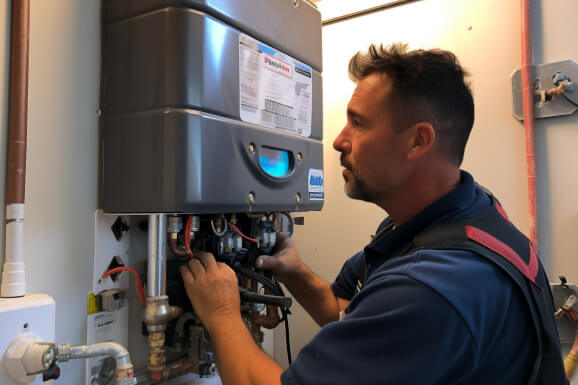
Factors that affect installation costs:
- Labor costs: Vary by location and job complexity.
- Home modifications: Some installations require gas line upgrades, new venting, or electrical updates.
- Heater type: Gas units often cost more to install than electric models due to venting and gas-line requirements.
Additional Cost Considerations
- Permits and code requirements: Many areas require permits for installation, which can add to the total cost.
- Brand and model: Premium brands and higher-capacity models may cost more upfront.
- Maintenance: Tankless units need periodic servicing, especially descaling in hard water areas, to maintain performance.
Long-Term Savings
Tankless water heaters heat water on demand, so you do not pay to keep a storage tank hot when you are not using it. Over time, improved efficiency can reduce utility costs and help offset the higher upfront investment.
See our tankless water heater diagram below to understand how these water heaters work and the parts involved.
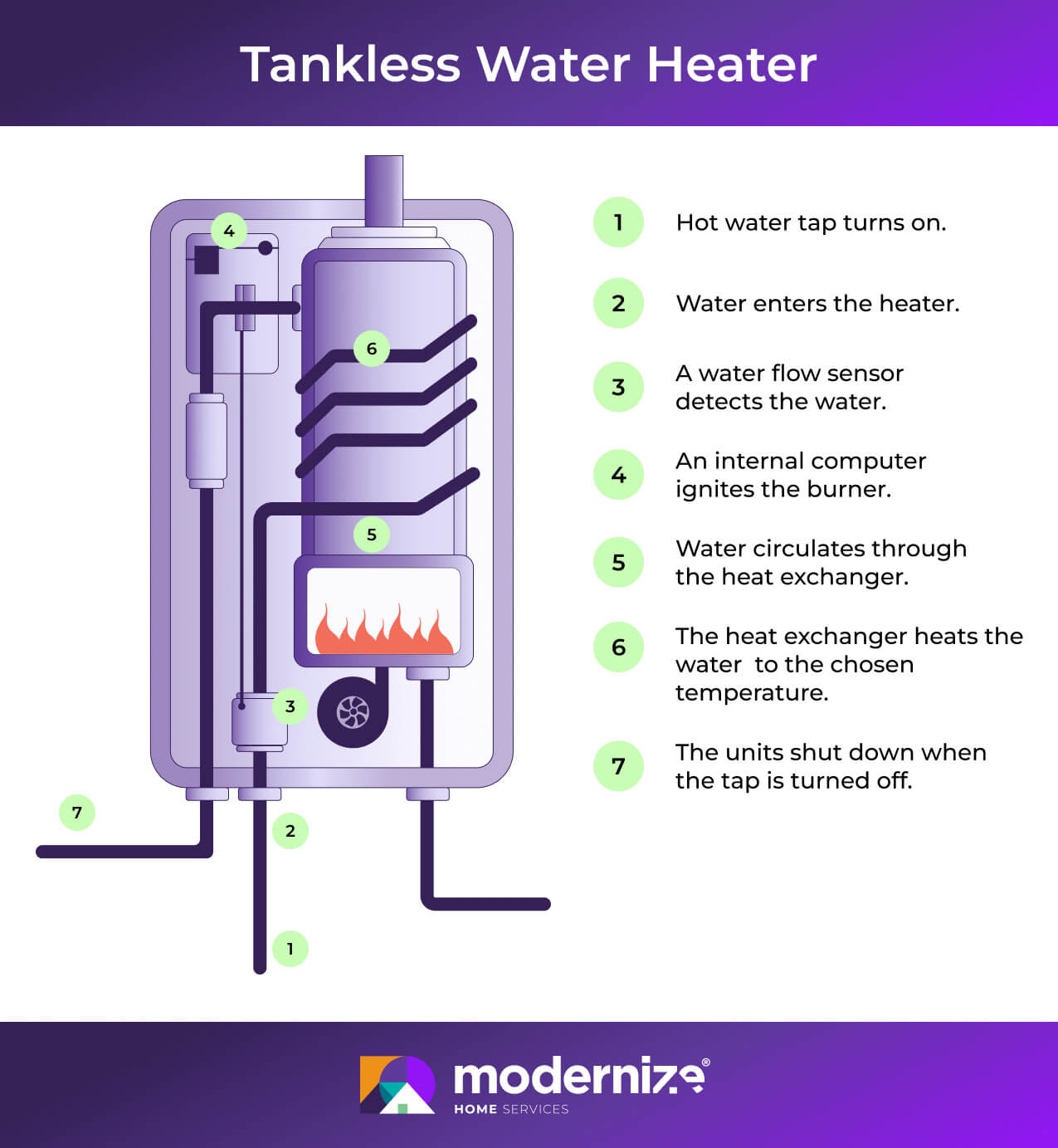
Best Tankless Water Heaters
Tankless systems are popular with homeowners who want energy efficiency and space savings. Because they do not use a bulky storage tank, they can be a good fit for smaller homes or tight utility spaces. The best tankless water heaters offer strong flow rates, reliable temperature control, and modern features designed to improve comfort and efficiency.
How Much Will I Spend on Operating a Tankless Water Heater?
Operating costs depend on fuel type, hot water usage, and maintenance needs, but tankless units are generally more efficient than tank heaters. Here’s what to consider.
Energy Savings
- Efficiency: Tankless water heaters typically use less energy because they heat water only when needed.
- Monthly utility bills: Savings vary by household hot water use. Homes using less than 41 gallons per day may see 24% to 34% energy savings. Homes with higher usage may see 8% to 14% savings.
Maintenance Costs
- Regular maintenance: Periodic flushing and descaling helps prevent mineral buildup, especially in hard water areas.
- Cost of maintenance: Some homeowners handle maintenance themselves, but professional servicing may be recommended depending on the unit and local water conditions.
Life Expectancy and Replacement Costs
- Durability: Tankless water heaters often last around 20 years with proper maintenance.
- Replacement planning: The longer lifespan can offset higher upfront costs because tank heaters may need replacement more often.
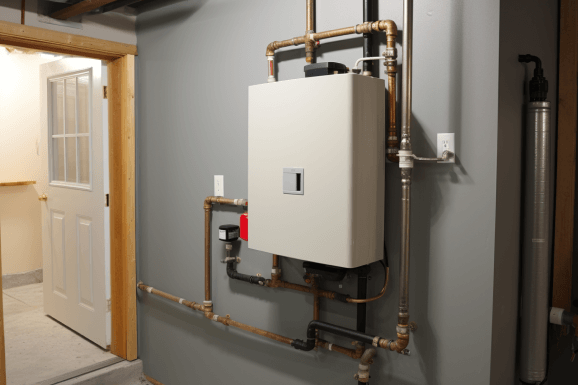
Pros and Cons of Tankless Water Heaters
Pros:
- Energy efficiency: Can reduce energy usage by 24% to 34% for homes using up to 41 gallons per day of hot water.
- Longevity: Often lasts up to 20 years, which is longer than many tank systems.
- Space-saving: A compact design frees up storage and utility space.
- Continuous hot water: Provides hot water on demand when properly sized.
Cons:
- Higher initial cost: Unit plus installation is usually more expensive than tank heaters.
- Complex installation: May require venting, gas line, plumbing, or electrical upgrades.
- Limited output: Some units can struggle with multiple simultaneous hot water uses if undersized.
How Do Tankless Water Heaters Compare Cost-Wise to Tank Heaters?
Traditional tank water heaters usually cost less upfront, often $300 to $1,500 for the unit, with installation commonly around $300 to $1,000. However, tank units are typically less efficient and usually last 10 to 15 years.
» See Our Comparison Guide: Tankless vs Tank Water Heaters
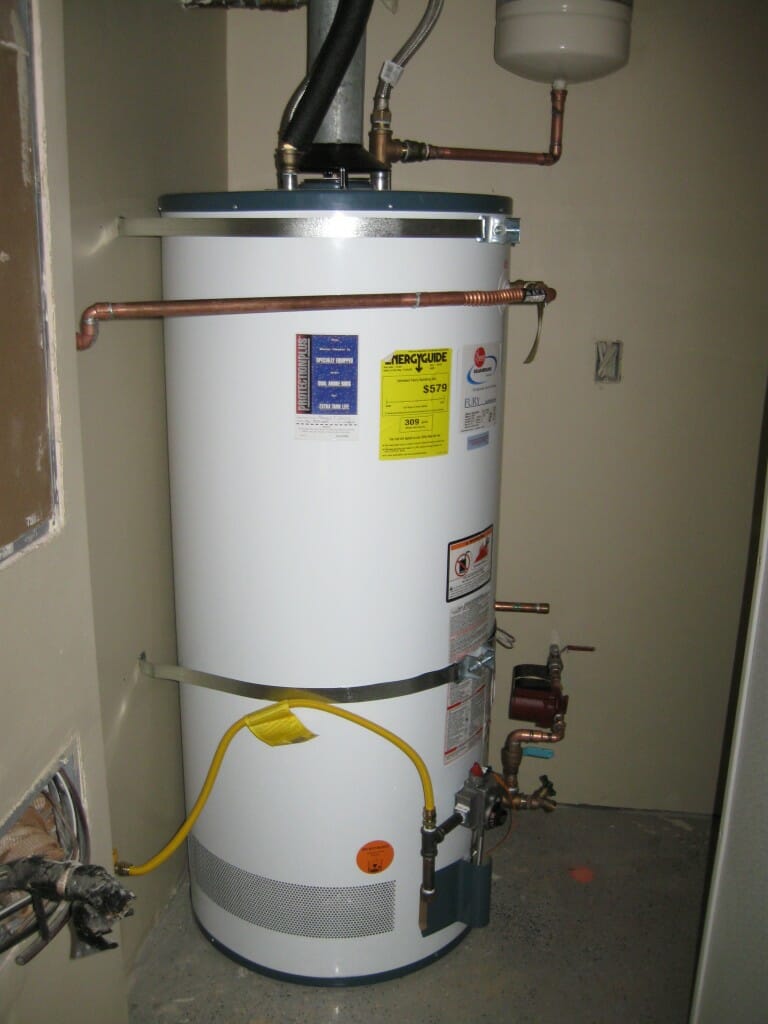
While tank systems have a lower upfront price, tankless systems can deliver long-term savings through higher efficiency and a longer lifespan. The choice between the two depends on your budget, hot water demand, space constraints, and long-term cost priorities.
Is a Tankless Water Heater a Smart Long-Term Investment?
Tankless systems cost more upfront, but many homeowners choose them for potential energy bill savings, a longer lifespan, and space savings. Because they heat water on demand, they reduce the energy loss of maintaining a hot tank 24/7. Over time, lower utility costs and fewer replacements can help offset the initial price.
For many homes, the deciding factors come down to your daily hot water use, the number of fixtures you run at the same time (showers, laundry, dishwasher), available fuel type, and the cost of installation upgrades. If those align, tankless can offer strong long-term value.
Compare top-rated plumbing pros in your area.
Read real homeowner reviews, explore qualifications, and view promotions. Modernize makes it easy to browse professionals and find one that will be perfect for your project.
